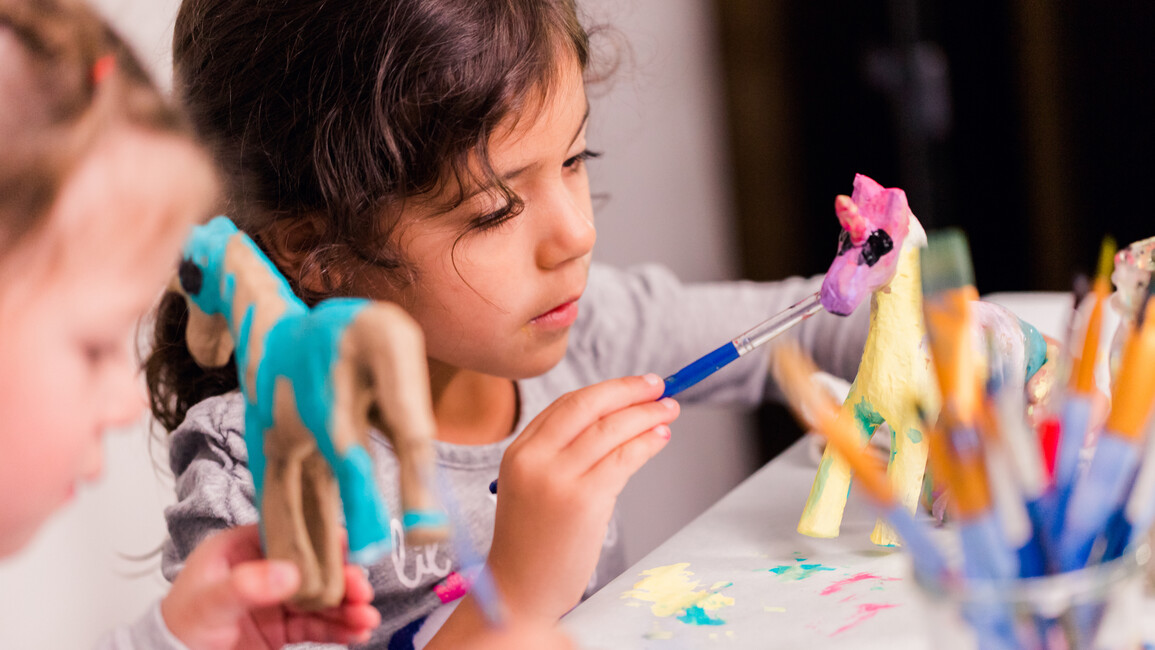Early Education
Education
Early education supports children in their first few years and provides them with the best possible opportunities for personal development and school career later in life.
Contents
Related topics
Opportunities
- Early education helps to narrow social inequalities. Good early education enables a better start in life for children.
- Thinking, understanding, interacting – children develop fundamental cognitive and social abilities in their first years of life. Early education has an impact on success at school and work.
- Early education enables children to discover their abilities and interests, promotes their personal development and strengthens the motivation to engage in lifelong learning.
Looking at picture books with their parents, experimenting in nature, writing their first numbers or letters – learning starts in families and continues mainly at day care centres. Early education covers programmes for toddlers, kindergarten and pre-school children as well as schoolchildren up to the age of 10.
The quality of early childhood education is of vital importance for children’s start at school and their subsequent learning and development. Furthermore, early education has a major impact on career prospects and social participation in adult life.
Child day care centres are important institutions of early education. They contribute to providing all children with a good start whatever their social background.
Early education must be of high quality in order to provide for excellent opportunities. Professional development for teachers and educators is needed to ensure such quality. The BMBF is operating various funding measures in this area.
Funding priorities in early education
As the environment and learning phases of children differ depending on age, the Ministry’s research funding measures have different focuses.
Language education
Language education covers children’s language and communication skills. Scientific findings from educational research are needed as a basis for providing the best possible programmes in this area. This is why the BMBF is currently funding research projects on language education in the immigration society. The aim is to secure and enhance language education for all people living in Germany, to develop support instruments for learners and study their impact.
Reading promotion
Reading promotion aims to develop children’s reading skills from a very early age. Children’s early familiarization with written texts can make an important contribution to a good start at school, enabling them to make the most of the education and participation opportunities that schools have to offer. Long-term cooperation with a mentor can make a difference in the educational biographies of children with reading difficulties at school. The Federal Ministry of Education and Research is supporting a number of reading promotion initiatives, for example “Lesestart 1-2-3” of the Stiftung Lesen and “MENTOR-Campus” of the MENTOR – Die Leselernhelfer association.
MINT/STEM education
STEM education in the fields of mathematics, informatics, natural science and technology (MINT) is another major priority of early education. The BMBF is funding a number of institutions and initiatives which raise young people’s interest in STEM subjects and offer relevant teaching. For example, the non-profit Stiftung Kinder forschen (Little Scientists Foundation) [Link zu Ebene 4-Seite StKf] supports high-quality MINT/STEM education for children of nursery and primary school age. Furthermore, the Foundation offers professional development programmes for educators. These teach them how to foster children’s curiosity and provide age-appropriate support in their discovery and exploration activities.
All-day programmes
The administrative agreement between the Federal Government and the Länder on an all‑day care investment programme entered into force on 17 May 2023. A legal claim to all‑day education for children at primary school will be gradually introduced from 2026. The benefit of all-day education and care mainly depends on the quality of the all-day programmes offered. This is why the Federal Government and the Länder attach special importance to quality in the expansion of all-day provision. High-quality education supports children in learning, provides self-confidence, skills and motivation, which encourage continuous learning and strengthen their ability to cope with life.
Education for sustainable development (ESD)
The BMBF works to strengthen early education for sustainable development. Children are taught basic values and skills and experience that they can themselves shape the world. They come to understand that their action impacts on other people and their environment. ESD aims to teach responsible thinking and action. For example, a project of the Stiftung Kinder forschen supports the professional development of teachers and educators and the overall integration of ESD in educational institutions.
Upskilling initiative for early childhood educators (WiFF)
The BMBF and the Robert Bosch Foundation established the upskilling initiative for early childhood educators in cooperation with the German Youth Institute (DJI). The aim is to lastingly strengthen the elementary level as the basis of the education system and the quality of education in day care centres through staff professionalization. Researchers prepare the available knowledge for practical application in the WiFF Transfer action line. The “Fachkräftebarometer Frühe Bildung” (early education skills barometer) has been published every two years since 2014, providing major insights into the respective situation regarding staff, labour market and qualifications in child day care.
This cross-Länder comparison over time provides important information for decision‑makers.
Bremen Initiative to Foster Early Childhood Development (BRISE)
This longitudinal study looks at families in difficult situations from pregnancy or child birth. The children grow up in urban neighbourhoods with a high unemployment and poverty level and little or no awareness of the available support programmes. The Bremen Initiative to Foster Early Childhood Development systematically integrates early and pre‑school support at local level and studies the impact on children’s cognitive, social and emotional development.


